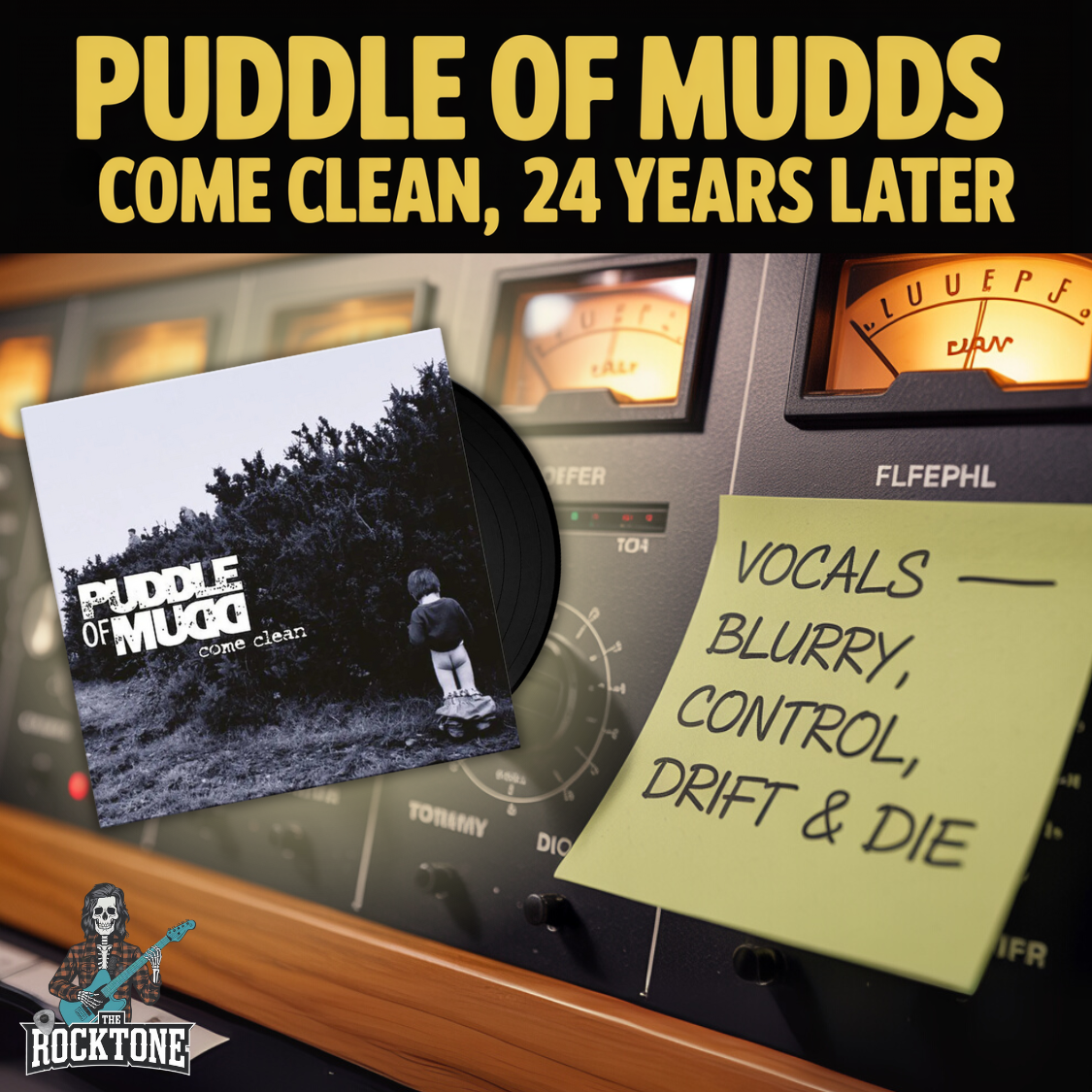Twenty-four years ago today, on August 28, 2001, Puddle of Mudd dropped “Come Clean”, a major-label debut that bulldozed onto rock radio, minted sing-along anthems, and turned a Kansas City bar band into a household name. The record peaked at No. 9 on the Billboard 200 and kept selling until it wore out the laser on your Discman. By January 2003 it was triple platinum in the U.S., with more than five million copies moved worldwide.
The Chart Success and Commercial Impact
In 2001, rock radio was a crowded highway. “Come Clean” merged at full speed. “Control” kicked the door, then “Blurry” landed like a meteor, a plaintive chord cascade wrapped around Wes Scantlin’s sandpaper tenor. It topped both the Modern Rock and Mainstream Rock charts and even climbed to No. 5 on the Hot 100, rare air for a hard-charging post-grunge band. On TV, the “Blurry” video, directed by Fred Durst, sat in heavy rotation and hit No. 1 on VH1’s Top 20 Video Countdown on March 30, 2002, while MTV was spinning the song across Spring Break and late-night blocks.

The singles were everywhere. “Drift & Die”, the pre-label staple that dated back to their indie days, spent six weeks at No. 1 on Mainstream Rock. “She Hates Me” barreled in the following year and became another radio steamroller. Meanwhile, “Control” even scored a sports-entertainment crossover as the theme of WWE’s Survivor Series 2001. If you listened to modern rock in those years, they were inescapable by design.
The Singles That Owned Rock Radio
Part of why the record hit so hard is that the parts snap together. John Kurzweg produced the album, and Andy Wallace mixed it, a one-two punch built for airwaves. The sound is clean and loud, with choruses that bloom and guitars that bite. “Blurry” leans on ringing arpeggios and a vocal melody you can whistle after one pass. “Control” rides a drop-tuned churn made for sweat and strobe lights. “Drift & Die” nods to an Alice in Chains mood without losing Puddle’s knack for a big hook. There is craft under the crunch, and the credits tell you why.
First-hand note, from the road: I’ve always rooted for Scantlin. I met him at Rock Allegiance 2011 in Winston-Salem at the Winston-Salem Entertainment and Sports Complex, home base for the Demon Deacons hoops crowd.
He came off as what many of us recognize in our own circles, a good intentioned guy with a bad problem, trying to get through the day and still hit the stage by sundown. That night’s stop was part of a Buckcherry and Papa Roach-topped package; the date and building are etched in the tour listings. As an offbeat side note… Josh Todd of Buckcherry stole the show that night with his dance moves. I never doubted his sincerity for “Lit Up” after this.

The monster success of Come Clean was lightning in a bottle… and yeah, that bottle shattered. The 2003 follow-up Life on Display went gold and even scored a No. 1 Mainstream Rock hit with “Away from Me.” That’s still solid… but let’s not kid ourselves. This wasn’t another triple-platinum knockout. It was a decent swing that didn’t quite clear the fence.
Hard Act To Follow
And gold may sound good, and it is! But when you stack it next to the insane momentum of their debut, it’s a clear step down. Just ask Deftones’ Saturday Night Wrist, which also hit gold but never matched the grip White Pony had on rock fans. Respectable? Absolutely. But not world-shaking.
By 2007, Puddle of Mudd had more radio ammo, “Famous” got attention, and “Psycho” clung to No. 1 for nine straight weeks. Radio kept the door open… but the fans didn’t flood through like before. The charts said yes. The marketplace shrugged. Shifts in taste, timing, and a hell of a lot of behind-the-scenes chaos? All part of the mix.
The Perfect Storm: Post-Grunge’s Golden Moment in 2001
Little-known details that deepen the picture. Josh Freese, now famous for seemingly playing on half of rock radio, tracked drums on the album without credit, a pro’s pro shaping the grooves that carried those choruses. And “Blurry” wasn’t born in a boardroom. Scantlin has said he reworked an older idea alone in a Los Angeles hotel room, missing his son, which is how you get a rock hit that feels like a diary entry. The intimacy cut through the distortion.
Behind the Scenes:
Two dozen years later, “Come Clean” could release today and still manage Platinum album status. It is one of the early-2000s rock blueprints, proof that big choruses and tighter-than-tight radio mixes can make heavy songs feel massive without sanding off the grit.
It also sits as a reminder of how rare that kind of ignition is. Most bands do not get one album like this. Crossfade would be another great example. Yet Puddle of Mudd did, and for a long stretch in 2001 and 2002, they owned the dial for Rock Radio.
Affiliate Statement
As an Amazon Affiliate, The Rocktone may earn a small commission from the purchase of items within provided links (at no additional cost to you!). Thank you for supporting The Rocktone.
Sources
- Album release date, Billboard peak, Platinum status, sales
- Wikipedia entry Come Clean (album) confirms release on August 28, 2001; peaked at No. 9 on the US Billboard 200; and credits Josh Freese (uncredited) on drums, John Kurzweg (producer), Andy Wallace (mixing), plus credit Nagging of album‑wide sales over 5 million and triple‑platinum certification in January 2003. Rollin’ RecordsRollin’ Records+6Wikipedia+6MusicGoldmine.com+6
- An external music memorabilia source reaffirms the August 28, 2001 release date and triple‑platinum (3× Multi‑Platinum) award by Jan 31, 2003. MusicGoldmine.com
- Josh Freese’s uncredited drum performance
- Modern Drummer article describes Josh Freese’s uncredited drumming on Come Clean, underscoring his session work. Facebook+11Modern Drummer Magazine+11Reddit+11
- Reddit trivia also underscores Greg Upchurch’s false drum credit, noting Josh Freese handled the drum parts. TV Tropes+1
- Singles performance—and their impact
- Wikipedia’s Puddle of Mudd page details:
- “Control” was used as the theme for WWE’s Survivor Series 2001.
- “Blurry” peaked at No. 5 on the Billboard Hot 100 and reached No. 1 on both the Modern Rock and Mainstream Rock charts; the video was heavy rotation on MTV and VH1. Wikipedia+13Wikipedia+13TV Tropes+13
- Rollin’ Recs / Music On Vinyl elaborates:
- “Control” was WWE Survivor Series 2001 theme.
- “Blurry” reached No. 5 on Hot 100, topped Mainstream/Modern Rock charts, earned ASCAP Song of the Year. “Drift & Die” spent six weeks at No. 1 on Mainstream Rock. Wikipedia+3Rollin’ Records+3Wikipedia+3
- Wikipedia – She Hates Me confirms:
- Released July 29, 2002; peaked at No. 13 on Hot 100; topped Mainstream Rock; earned an ASCAP Pop Music Award. MusicGoldmine.com+5Wikipedia+593.3 WMMR+5
- Wikipedia’s Puddle of Mudd page details:
- Follow‑up album performance
- Wikipedia’s Life on Display page confirms:
- Released November 25, 2003; certified Gold in the U.S.; peaked lower and sold around 706,191 units compared to Come Clean; includes “Away from Me” reaching No. 1 on Mainstream Rock. Horrible Music+1JOSH FREESE+4Wikipedia+4Wikipedia+4
- Wikipedia’s Life on Display page confirms:
- Context: chart dominance and band background
- Wikipedia’s main Puddle of Mudd entry provides:
- Origin (Kansas City), formation in 1992, and total album sales (over 7 million).
- Come Clean sales (over 5 million copies by 2003); “Blurry” as signature song, Hot 100 No. 5; notes that Come Clean was their major label debut in 2001.
- Wikipedia’s main Puddle of Mudd entry provides:







One response to “Puddle of Mudds ‘Come Clean’ turns 24 today, a retrospective on the multiplatinum debut”
[…] a band often remembered as part of the 2000s emo and post-hardcore wave, this viral moment thrusts them back into the broader conversation. Whether that exposure helps or […]